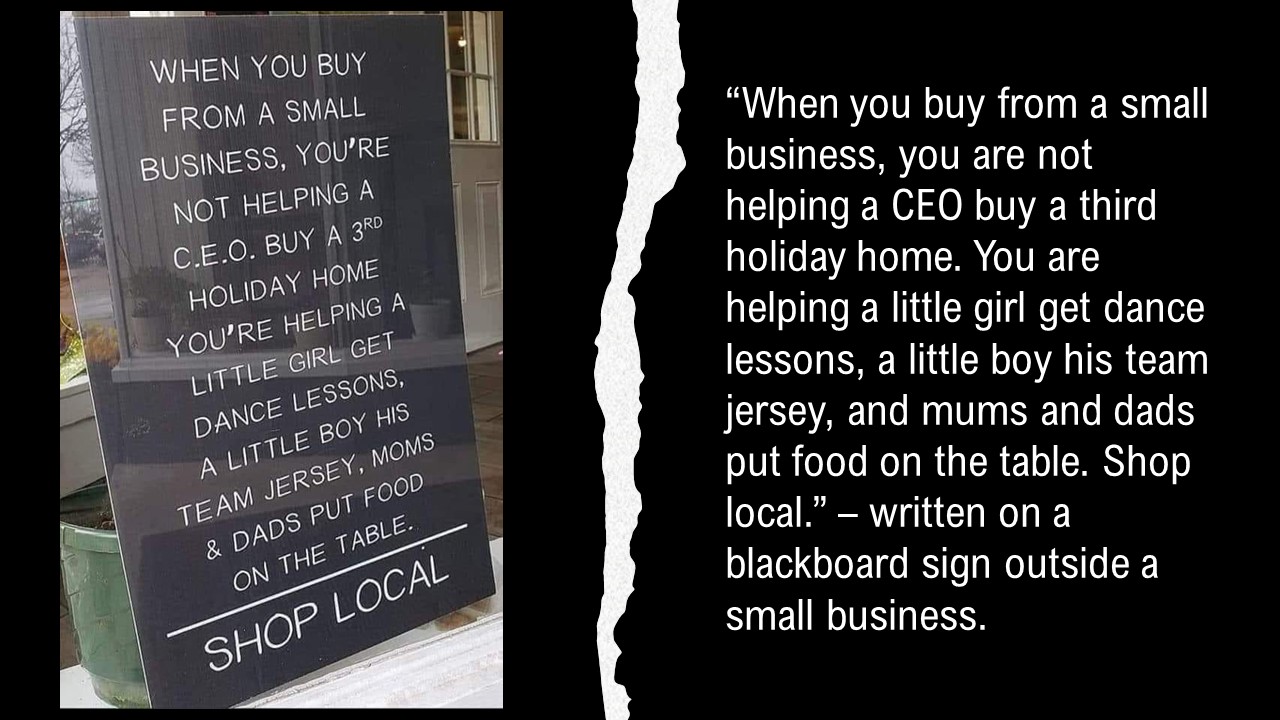Needed: your support - only local communities can save worthy small businesses

This is exactly the sentiment and economic philosophy needed to revive small, independent shops and businesses in the global economic slump they find themselves in, in no small part thanks to Covid-19 and the worldwide lockdown.
Long before coronavirus was common vocabulary, severe recessions and constant economic pressures put paid to a lot of independently run, small and even micro business operations. The virus was ultimately just the final nail in the coffin, the last line on the death warrant that would finally seal the fate of thousands of these little shops and businesses the world over.
Before the advent of the virus, a member of the community would be inspired by a unique or creative idea, or feel adventurous enough to tackle such an undertaking. They would start scouring around for some furniture, appliances, shelving and suppliers of stock, do market research, tour the town up and down for a suitable venue, negotiate rent with rather unscrupulous shopping centre landlords, and finally take out a small ad in the local paper to announce their grand opening.

Now, whether or not this person should be in business in the first place, or has enough business sense or experience to carry through such an undertaking to any length of successful tenure, is entirely a matter unto itself. In this piece, I am primarily concerned with the public’s reception of a small business opening up in town, and its response to it. For the purposes of this piece, we will assume the owner is proficient at business practices and economics, has a decent product or service to offer, and really fills a niche in the town’s local trade. A business, in other words, worthy of local support.
Depending on where you reside, and how wonderfully generous or spiteful and vitriolic the locals are, a small business undertaking is for the most part at the mercy of its community. Some customers, if they find the product useful and the service excellent, will keep on supporting the shop on a regular basis, depending of course on how frequently it is reasonable to do so. Others, however, wait with bated breath to swoop in like vultures at the first sign of trouble, taking delectable schadenfreude at failure, bankruptcy and closure. Needless to say, these outstanding members of the citizenry never once contributed at all to the cause in the first place, however worthy it might have been of it.
“Rihanna releases a lip gloss. People buy it. Michael Jordan puts out a new shoe. People buy it. Matthew McConaughey is the spokesman for a car and people want it. Apple releases a new phone and people stand in line for it. Oprah promotes weight loss programmes; folks jump on board.
Beyoncé has a concert, people spend $250 a ticket.
A friend or family member starts a new business, people get wary! ‘Need to research it, first!’ ‘Too expensive! It will never work.’
What is wrong with this picture? Why are we so quick to support someone we do not know, who has plenty of money already, but we have a million reasons not to support someone we know living a regular lifestyle?
When you support direct sales and small businesses, you are helping families you know feed their kids, pay their mortgage, and find their happiness and wellbeing, not contributing to a celebrity's endless bank account!
So next time you see a friend (or me, for that matter!) posting about their business, give them a quick like, share or comment. You do not even have to buy the product or service. It all helps us to gain more exposure for our business; it really helps!” – copied and shared throughout social media platforms, to the point of going viral.

Contributing to a worthy cause need not entail you reaching for your wallet and parting with your hard-earned money, if you so wish, or if you cannot afford it. Other gestures of support will go an indeterminably long way to helping the business out, and may even do much more good than would a purchase of, say, R50.
Spread the message. Employ word of mouth. Advertising is a terribly expensive overhead and in most cases nowhere near as effective. You could be helping to make a major contribution in this regard. Tell your friends and family. Follow the shop on social media, write them a positive review and engage with their posts. Give them a shout-out where you can in your own posts. Sign up for their newsletter and share it to all and sundry.
The costs of doing this? Five minutes of your time and an infinitely small portion of the data you get delivered uncapped, anyway.
“Did you know: If each of us spent £100 a year more on local businesses instead of chain stores, it would put an extra £3 mill a year into our economy, and it would create thousands more jobs every year. #Supportlocal” – seen written on another blackboard sign outside an independent shop in Britain.
Do not stop at independent shops. Consider local markets, church bazaars, boeremarkte and entrepreneurs. Make an effort to withdraw cash, as card machine rentals are not always feasible or affordable. Support something someone really believes in; try to buy a little something from everyone everywhere you go, within reason.

A good friend of mine whom I admire, the very epitome of pure entrepreneurial spirit, studied horse management after school, got a skipper’s licence to conduct chartered cruises in the Caribbean, came back to manage her father’s properties and business interests, started her own reiki practice and healing room, bought a second-hand bus and converted it into a mobile pizza parlour and hires it out for catering at events and functions, and even now is looking into other avenues and branches. If anyone deserves the support of her friends, family and local community, it is people like her.
Editor: Anchen Coetzee
Written by: Wahl Lessing





